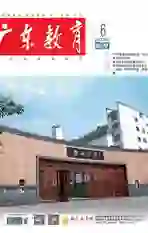“契科夫法则”在读后续写中的运用
2022-06-30陈光伟
陈光伟

在续写创作中,考生容易因忽略文章中隐藏的信息,导致续写部分融洽度不高。
“契科夫法则”是19世纪俄国作家契科夫短篇小说善用的一种文学技巧,即“在故事早期的某一元素,直到后面才显现其重要性。换言之,在故事开头出现过的事物一定会在故事后面展现,否则,它就不应出现。”同样,在原文中如果出现作者用一定笔墨描写的事物,在续写中就应该有再次出现的必要。牢记此法则,可帮我们抓住隐含线索,突破读写协同的困境。下面我们来看一篇例子:
阅读下面材料,根据其内容和所给段落开头语续写两段,使之构成一篇完整的短文。
Growing up, I understood one thing about my dad: He knew everything. This was our relationship: I asked him questions and he told me the answers.
In my teen years, he taught me things I’d need to know to survive in the real world. When I moved out on my own, I called him usually when something broke into my apartment and I needed to know how to fix the toilet, the air-conditioner or the wall.
But then, eventually, I needed him less. For everything, I had Google. I don’t know when it happened, but when I called,our conversations developed into six words. Me:“Hi, Dad”. Him: “Hi, sweets. Here’s Mom.”I loved my dad, of course, but I wondered at times if maybe he had already shared everything I needed to know.
Then, this past summer, I moved in with my parents for three weeks while my house was being repaired. They own a lake house, and Dad asked me to help him rebuild the bulkhead(隔板)at their dock(船塢).
“How do you know how to build a bulkhead?”
“I spent a summer in college building them on the Jersey shore.”
“You did?”I thought I knew everything about my dad. I knew about the summer at the manufacturing plant that burned his hands raw, and even the tiny little kitchen, where he learned how to make the best pancake. But I never knew this.
“Yes. Now come up here and let me teach you how to use this circulars saw(圆锯).”All of a sudden, I realized that maybe it’s not that there’s nothing left to say. Maybe it’s just that I’ve spent my life asking him the wrong questions.
注意:
1. 续写词数应为150左右;
2. 请按如下格式在答题卡的相应位置作答。
We ended up our talking but I was lost in thought. ________
_____________________________________________________
“Wait, Dad,”I said.“How are you?”_________________
_____________________________________________________
语篇解读
作者小时候一直认为父亲无所不知,有什么问题都向父亲寻求帮助。长大后,作者觉得自己已经很了解父亲了,并且有问题可以从网络上搜索,以至于慢慢地,和父亲没有什么话可说了。然后,在刚刚过去的这个夏天,作者搬去和自己的父母住了三个星期。作者的父亲让作者帮他重建码头的隔板。续写部分分为两段,第一段开头是:我们结束了谈话,但我陷入了沉思,所以应该写作者重新审视自己对父亲是否真的了解,发现一直以来自己只是从父亲那里获得问题的答案,从未试图真正去了解父亲的生活。本段应详细描写作者内心的想法。第二段开头是:“等等,爸爸”,我说,“你好吗?”本段应该写那天作者和父亲聊了很多,作者发现自己想和父亲说话,这是一个全新的开始。
考生习作
We ended up our talking but I was lost in thought. How much on earth did I know about this man in front of me? I stared into Dad, reading his modest expression, reading his wrinkles imprinted by age, together with untold stories.“You listening?”Dad’s gentle voice dragged me back to reality. I nodded. Then with acquaintance, he displayed me the usage of the saw and gave me detailed instructions, which to a large extent amazed me. It was at this moment that he accidentally hurt his finger. With beads of blood dropping, he continued his work as if nothing had happened.
“Wait, Dad,”I said.“How are you?”Looking up, Dad noticed my worry and smiled. He went to grasp some soil near the lake and covered them around the injured finger. Before long, it miraculously stopped bleeding. I wowed in awe, which marked the beginning of our further communication. When building the bulkhead, Dad shared with me his arduous life journey and countless skills and knowledge he boasted. On finishing rebuilding,I was lost in thought again. I always ask questions centering myself instead of Dad. I blamed myself now for not knowing him well. It’s time for me to ask the“right”questions.
教師点评
该作品中,主题、人物形象的设计都没有问题;情节方面,考生未能准确理解“How are you?”这一问候语(与Are you all right?混淆),设计了父亲受伤这一情节,此处需改进。结尾处It’s time for me to ask the “right”questions与原文最后一句Maybe it’s just that I’ve spent my life asking him the wrong questions形成照应,也是亮点之一。整体来说,该作品用词准确,句型结构多样化,语流通畅,体现了考生较好的语言素养。
但如果利用“契科夫法则”审视考生续写,不难发现原文中几处较明显的伏笔,考生作品并没有体现,如Me:“Hi, Dad”. Him:“Hi, sweets. Here’s Mom.”这个第三段提到的场面却在后面的文章中只字未提,根据“契科夫法则”,前有因必定后有果,我们可以在续写第一段的结尾将打电话这一情景元素融入进去。作者与父亲通电话,父亲按往常想把电话转给母亲,这与第二段的“Wait, Dad,”I said.能较好地衔接起来。那如何设置一个打电话的场景呢?可以增加作者已经搬回去这一情节,这与原文的I moved in with my parents for three weeks while my house was being repaired也能形成呼应,并且“How are you?”的问候也更符合这个情景。具体表达见作文范例的划线部分。
作文范例
We ended up our talking but I was lost in thought. For years, I had taken it for granted that dad could give me answers to any of my questions only if I asked, but seldom did I try to understand his life just like the summer when he was building bulkhead and what he wanted from me. Maybe he was also eager to share his story with me, or he wouldn’t have asked me to help him rebuild the bulkhead. After all, it was hard, manual labor. A few weeks later, after I moved back into my house, I called my parents. Dad answered.“Hi, sweets,”he said.“Here’s Mom.”
“Wait, Dad,”I said. “How are you?”We talked a lot that day, from the little quarrel between him and my mom to the job he was working on. Nothing important. To anyone else, it would sound like a normal conversation between a dad and his daughter. But to me, it was novel, as well as to my dad. I sensed his voice with excitement and delight. It was a whole new beginning. I spent the first part of my life needing to talk to my dad. Now I talk to him because I want to.
责任编辑 蒋小青
